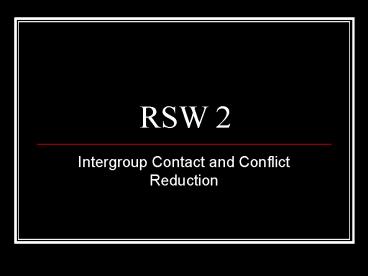RSW 2 - PowerPoint PPT Presentation
1 / 18
Title:
RSW 2
Description:
Produces stereotypical and normative group perceptions. Self-enhancement ... Conflict based on the interrelation on multiple social, economic, and political aspects ... – PowerPoint PPT presentation
Number of Views:39
Avg rating:3.0/5.0
Title: RSW 2
1
RSW 2
- Intergroup Contact and Conflict Reduction
2
Last Week
- Social Identity Theory
- Identity as a continuum
- Identity and religion
- Applying SIT to Northern Ireland
3
Categorisation and Self-enhancement
- Categorisation
- Defines group boundaries
- Produces stereotypical and normative group
perceptions - Self-enhancement
- Ensures that stereotypes produced in
categorisation favour the in-group
4
Negative Stereotypes and Prejudice
5
Intergroup Conflict
- Brewer (2001) - Competition for resources
promotes negative out-group attitudes - Change from in-group identification to
co-operative interdependence to intergroup
conflict is progressive
6
Realistic Conflict Theory (Sherif, 1962)
Limited resources
Conflict between groups
Prejudice and Discrimination
7
Robbers Cave (Sherif, 1961)
- Eagles vs. Rattlers
- Reduction of intergroup contact
- Group cohesion increased
- Competitive activities introduced
- Intergroup hostility ensued
8
The Contact Hypothesis
- Concerned with reducing intergroup prejudice and
discrimination - Necessary conditions for success
- Support of authority figure
- High levels of acquaintance potential
- Equal status interactions
- Co-operative interdependence between groups
9
Robbers Cave
10
Contact Hypothesis 2 Further Conditions
- Multiple members
- Disconfirms stereotypes of entire group
- Informal setting
- Groups interact in a relaxed way where
understanding and knowledge sharing are
facilitated
11
Decategorisation
- Brewer Miller (1984)
- In- and out-group categorisations cause
deindividuation - Out-group members viewed as undifferentiated
representatives of a social category - Interactions should therefore focus on personal
characteristics
12
Recategorisation
- Promotes a new, inclusive identity of which both
groups can claim membership - Us and Them become We
- But there are problems with both
decategorisation and recategorisation
13
Mutual Differentiation
- Hewstone Brown (1986)
- Co-operative interactions promote intergroup
distinctiveness - Seeks to maintain social identities and positive
distinctiveness - Groups should have distinct but complimentary
roles
14
Conflict Contact in Northern Ireland
- Conflict based on the interrelation on multiple
social, economic, and political aspects - Limited opportunities for contact
- Segregation is important in perpetuating the
conflict
15
Conflict Contact in Northern Ireland
- Cairns Dunn (1995) positive correlation
between cross-community contact and attitudes to
the out-group - Pettigrew (1997) cross-group friendships reduce
prejudice - Stephen Stephen (1985) contact related to
reduced intergroup anxiety
16
Conflict Contact in Northern Ireland
- Hewstone et al. (2005) cross-community
friendships related to reduced prejudice,
increased trust and forgiveness
17
Summary
- Negative stereotypes and prejudice
- Prejudice and intergroup conflict
- Realistic Conflict Theory
- Sherifs Robbers Cave Experiment
- Contact Hypothesis
18
Summary
- Conditions necessary for success of Contact
Hypothesis - Decategorisation, recategorisation, mutual
differentiation - Conflict and contact in Northern Ireland































